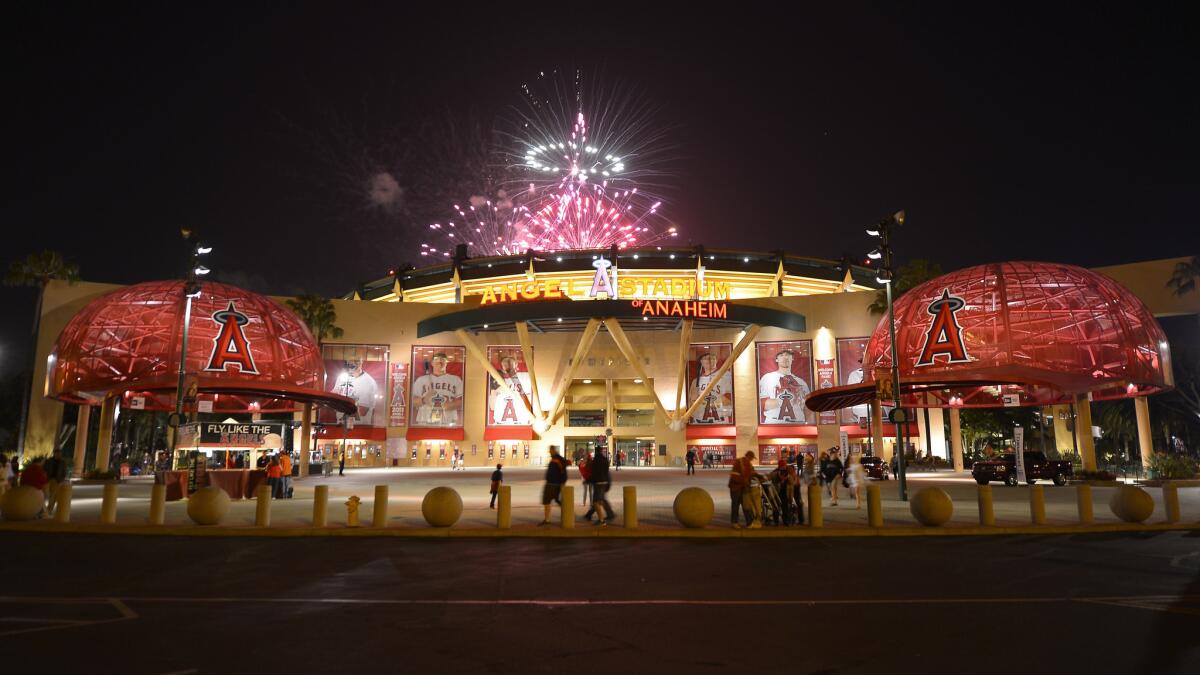It could be years before Anaheim gets paid for Angel Stadium property

- Share via
The Anaheim City Council is expected to approve a sale of the Angel Stadium property next week, but the city may have to wait until midway through the next decade to get most of its money, according to sale documents released by the city Tuesday.
SRB Management, a company affiliated with Angels owner Arte Moreno, has agreed to buy the 153-acre site for $325 million. The company also would sign a separate agreement ensuring that the Angels would play in Anaheim through 2050.
Under the agreement, SRB would make a series of deposits. The total deposits could range from $70 million to $100 million, and the payments to the city could be staggered from 2020 through 2023, depending on how soon SRB submits development plans to the city.
The bulk of the payment would be due when the deal closes, as late as 2025. It is unlikely the city would get all $325 million.
The amount could be reduced by incentives the city said it would consider in order to secure affordable housing and parkland in the project, and employ local workers.
The amount also could be reduced by an infrastructure payment or rebate. For instance, Sacramento agreed to pay $33 million for the development of a new Major League Soccer stadium. The Angels have not said whether they plan to rebuild or replace Angel Stadium.
Those reductions would be included in a development agreement. That would set forth the plan for the site — shops, restaurants, homes, hotels could be coming — and would say whether the Grove theater would be retained or demolished.
But the development agreement is not anticipated until next year, which one Anaheim city councilman said would put the council in the position of approving a land sale without any guarantee of what the city’s payment might ultimately be, and without any legal commitment for what SRB might do with the land or when it might actually build.
“We’re supposed to vote on a sale price based on a whole lot of assumptions there are no clarity on,” Councilman Jose Moreno said.
When the city announced the deal last week, a city fact sheet said development could take place from 2025 through 2050.
The city released an economic impact summary Wednesday, based on a study conducted by RCLCO, a Los Angeles-based real estate advisory company. The city did not release the study.
According to the projections listed in the summary, development spread over 15 years would generate 18,000 full-time construction jobs, paying $1.5 billion in wages. The city has pledged to pursue an agreement that would prioritize local hiring for those jobs.
At completion, the project is expected to create 15,000 full-time jobs in retail, office, hotel and property management, paying $1 billion in wages. The study estimated the city would get $20 million in annual tax revenue from the site, including the stadium.
Mike Lyster, the city spokesman, said that figure included property taxes and sales taxes, as well as the tourist taxes from a possible hotel on the site.
When the city announced the deal last week, the city fact sheet estimated $7 million in annual tax revenue. At an informational session for the public Monday, the city estimated $10 million.
“I have to make an evaluation on which one to use,” Lyster said. “Based on the new information I saw in the past few days, I felt comfortable going with 10 as a conservative number.”
The sale agreement also includes what amounts to an earthquake contingency, not a trivial issue given the aftermath of the 1994 Northridge earthquake, when a 17-ton scoreboard toppled into the Angel Stadium seating area. The damage cost an estimated $10.1 million to repair.
According to the sale agreement, if the property is “damaged or destroyed by any casualty” that would require more than $2 million to repair, and if the sale has not yet closed, Moreno’s company can cancel the deal.
More to Read
Go beyond the scoreboard
Get the latest on L.A.'s teams in the daily Sports Report newsletter.
You may occasionally receive promotional content from the Los Angeles Times.







